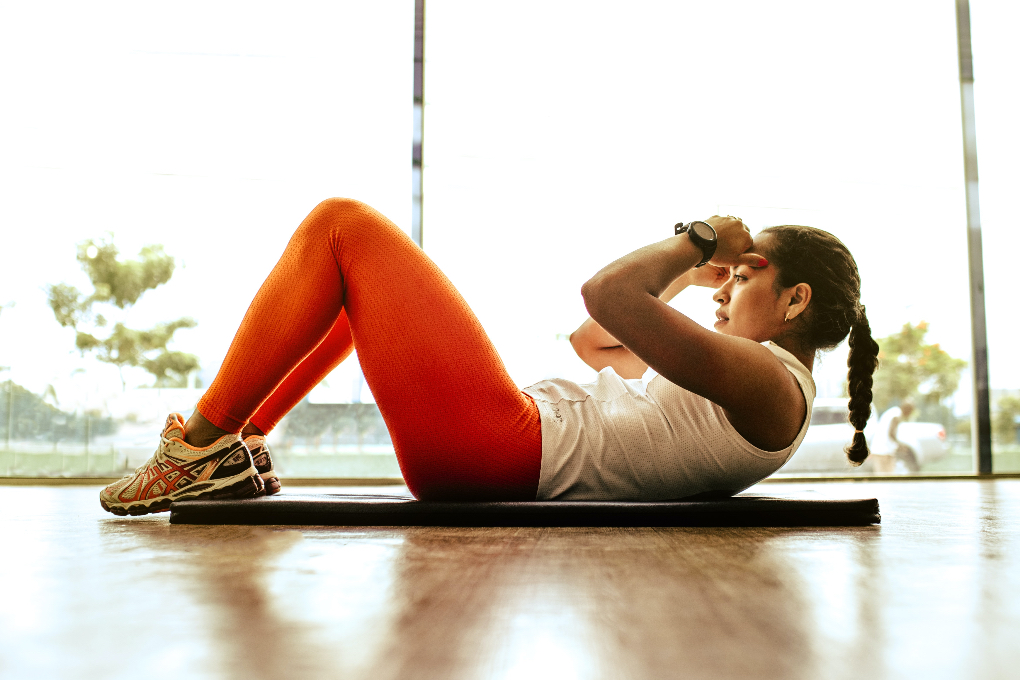You must have heard from your doctor or read on the internet that exercise is important for PCOS management, and you may have wondered – is this really true? How can exercise improve my PCOS symptoms? Moreover, what kind of PCOS-specific exercises should I be doing? Don’t worry, we got you cyster!
For anyone who is skeptical, yes exercise can and will help you manage your PCOS symptoms. Research has shown that exercise can simultaneously reduce hyperandrogenism (excess production of male hormones) and insulin resistance, the two major clinical features of PCOS. Most women with PCOS are insulin resistant, which means that their bodies do not respond to the hormone insulin, which is responsible for instructing cells to absorb sugar that is in the blood after digestion. This leads to abnormally high blood insulin and sugar levels, which increases the risk of diabetes and production of male hormones. Hyperandrogenism and insulin resistance lead to symptoms such as irregular periods, excess facial and body hair, and abdominal weight gain.
Benefits of exercise
1. Exercise activates pathways that improve insulin sensitivity and break down male hormones
Due to insulin resistance, cells cannot efficiently absorb and break down sugar for energy. When you exercise, your muscle cells are working and require energy from sugar breakdown. This leads to the activation of a pathway that allows your muscle cells to become more sensitive to insulin.This drops blood insulin and sugar levels, which reduces the risk of diabetes, regularizes your menses and assists in weight loss. Exercise also activates a pathway that breaks down male hormones, called androgens.1 This leads to a reduction in excess facial and body hair growth, hair fall and abdominal fat storage.
2. Exercise reduces the risk of heart disease and diabetes
Several other studies have shown that exercise lowers insulin resistance, abdominal fat percentage and the level of fats floating in the blood (called triglycerides) in PCOS patients. Abdominal fat can be especially dangerous as it wraps around your internal organs and increases the risk of heart disease, stroke, and high blood pressure.The good news is – even with minimal weight loss (1.6%), researchers have seen significant reductions in abdominal fat levels (11%) in overweight and obese PCOS women who exercise.2 This is very encouraging; even if you are not losing weight while exercising, there are changes happening inside your body that are improving your heart health, decreasing your risk of diabetes, and reducing your PCOS symptoms. So keep going, cyster! 🙂
3. Exercise can restore ovarian function
Lifestyle modification is the best initial management for overweight PCOS patients seeking to improve their reproductive function. Exercise has been shown to increase the frequency of ovulation (egg release from the ovary) and menses in obese PCOS patients with infertility (caused due to lack of ovulation). This signals a restoration of ovarian function and researchers believe it is due to exercise-induced reduction in insulin resistance.
Type of exercise
Now that you’re aware of the importance of exercise in managing PCOS symptoms, you may be wondering where to start. How often should I exercise in a week? And for how long? Well, there is a lot of ongoing research on this. Overall, current guidelines for the general population recommend 150 minutes of exercise per week – you can divide this into five 30 min sessions through the week!
For what type of exercise to do, the first thing to remember is that the type does not matter as long as you are being regular. Do exercises you enjoy, this will help you sustain your exercise routine in the long run. Now, if you are just starting out, we would recommend going slow. Start by increasing movement through the day – choose to take the stairs instead of the elevator, go for evening walks, do more household chores. But for a holistic exercise routine, it is recommended to combine cardio and strength training.
1. Aerobic and HIIT exercises
Research has shown that aerobic and high-intensity interval training (HIIT) are effective at improving health outcomes in women with PCOS. Aerobic exercise includes running, cycling, swimming or aerobics. HIIT exercises are high-intensity cardio exercises which you can do in spurts of 30 seconds to 3 minutes, followed by recovery periods of 15 to 30 seconds. The HIIT exercise technique can be used for any form of cardio exercise – for example, you can do burpees, squats and jumping jacks in this fashion, or you can sprint as fast you can for short spurts followed by periods of rest, or you can alternatingly rest and pedal a stationary bicycle as hard and fast as possible for short spurts.
HIIT exercises are popular as they can help you stay fit without requiring a big time commitment; you can easily fit a quick 15 minute HIIT workout in the middle of a busy day and still see the same benefits as longer sessions of running, swimming or cycling.
Both aerobic and HIIT exercises are effective at improving insulin resistance, and reducing BMI and LDL (bad cholesterol) in women with PCOS. HIIT is also associated with higher levels of HDL (good cholesterol) in PCOS patients. HDL protects against heart disease, so the more of that in your body, the better!
2. Strength training
Strength training is also great for PCOS. It increases muscle strength by making your muscles work against a weight. You can use free weights, weight machines, resistance bands or your own body weight. Strength training alone or in combination with aerobic exercise improves health outcomes like insulin sensitivity, abdominal fat percentage, and reduces risks of diabetes and heart diseases., It also increases flexibility, muscle strength and stamina. Additionally, make sure to take time for rest and recovery, this will help your muscles grow and get stronger!
In general, varying your workouts can help you push past a weight plateau (when you remain at a certain weight despite consistent workout).
Overall, exercise is associated with better mental health and sleep outcomes. Exercising releases serotonin, the feel-good hormone, that can help reduce PCOS-induced mood swings and stress. Exercising regularly will boost your self-confidence and body image. Unlike what most doctors will tell you, exercise is not for losing weight. Losing weight may be a consequence of exercise, but whether you lose weight or not, exercise will help improve your PCOS symptoms. So if you don’t see the numbers go down on your weighing scale despite sweating it out for weeks on end, do not fret! We assure you it’s doing wonders inside – it is balancing out your hormones and slowly, but surely, reversing your PCOS symptoms.
If you experience any of the above symptoms, it is best to visit a doctor to get a proper diagnosis. While these symptoms don’t necessarily mean you have PCOS, they could also be underlying symptoms of other conditions. Early detection and treatment can make a huge difference in managing your PCOS and maintaining your overall health.
Disclaimer: Content on Veera is provided for informational purposes only and is not intended as medical advice, or as a substitute for medical advice given by a physician



















